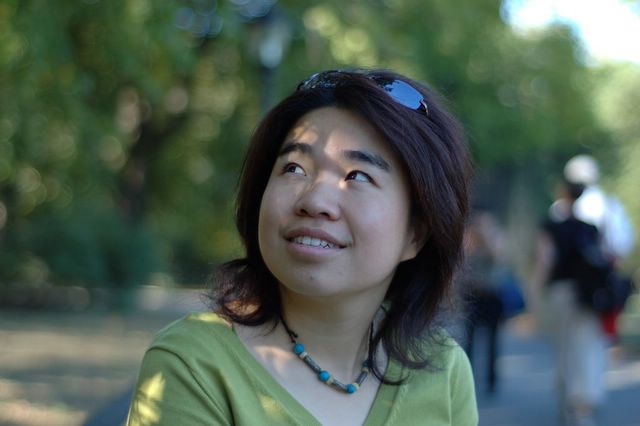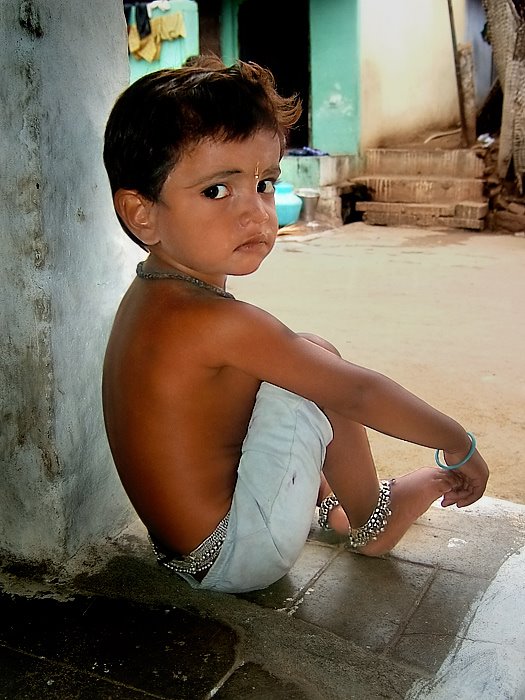
2007年2月22日星期四
冬天的动物园

2007年2月20日星期二
《烟花》,或者与爱无关的二三事

Drunkpiano 的《烟花》不是在写爱与被爱的故事,她在谈论人的终极问题—存在的理由和方式。在她的故事里,女人们好像总是因为找不到真爱而折磨,男人们则不断遭受事业的挫折。他们蝇营狗苟地生活着,都感到寂寞和绝望。表面上,他们痛苦的原因是找不到爱,找不到人生的依托;实际上,他们的痛苦是爱也无法解决的。与其说醉琴在写爱情故事,不如说她在写反爱情的故事。
客居海外的这一群异乡人的痛苦,是由他们错位的生存状态所决定的。在异国,他们总是外国人。在社会中,他们拥有高学历但是找不到适当的工作机会。在人际关系中,他们远离了自己的家人,因此对于伴侣有更高的要求,这种过高的期望往往得不到满足。在中国,他们或许可以自如地生活在主流社会中(例如蒋刚的朋友);但是在美国,他们注定要在非主流文化中挣扎。因此,故事中的“性高潮”实际上是指充分地自我实现,多数留学的男男女女都很难实现这一点。
虽然现在不兴用阶级斗争的那一套来分析文本了,但不容否定的是在美国这样一个移民国家中,中国留学生的总体地位仍然非常低下。因此他们的经济诉求、政治诉求,甚至生理诉求很难得到实现。这种挫折是无法避免的,在一个移民社会中更是如此。除了社会阶层,留学生还时常面临种族、国籍、性别等多种歧视,因此,个人的挫折实际上是他们整体社会处境的反映。最近李玉导演的影片《苹果》,可以说是对进城民工状态的绝妙描写。即便上了城里人的床,民工仍然被用作传宗接代的工具,哪有他妈的什么爱?
长期作为边缘人的经历,毋庸置疑地会影响一个人对自己存在的怀疑。吴香因为自己没有性高潮而怀有的自卑,蒋刚因为晋升失败而产生的自卑,以及李查德由于投资失败而产生的自卑,都是对自己生活状态的怀疑。但是,他们往往将这种怀疑投向自身,而不是寻求挫折的根源。《烟花》中人物的可悲,正是由于他们对自己当下状态产生原因的不自知,他们的认命,他们的活着。“烟花”代表了他们对人生理想状态的追求,但是为了活着,他们只能把对烟花的渴望放在路上。他们对自己命运的反抗是消极的,顶多是在网上灌水、寻找新的肉体关系、离婚、踢球。
醉琴的高妙之处就在于她把一个大道理写成个人命运的小插曲,举重若轻,信手写来。然而也正是因为如此,许多人忙于将自己的经历和《烟花》中人物的经历仍同起来,忽略了文章背后的凄凉。醉琴的女主人公向往得到很多很多的爱,其实这一点亦舒在《喜宝》里面早就说过了。喜宝要很多的爱,如果没有爱,有很多的钱也行。在无根的后现代社会中,什么是安身立命的根本?《烟花》实际上提出了这样一个本体论意义上的问题。即便没有错位的留学生活这样一种境遇,每个人仍然要回答这个问题。
我是写不出《烟花》这样的小说的,我没有那样的社会阅历,而且我的心里对爱还存着一点信念。我喜欢《在世界的尽头呼唤爱》,因为它对爱的那一点信念。
又及:昨天信誓旦旦地要戒除博客十天,今天即犯戒。自罚白开水一大杯。昨天听说大学同宿舍室友结婚,隔壁宿舍室友生了女儿,一时之间悲喜交集。“女儿悲,青春已大守空闺。女儿愁,悔教夫婿觅封侯。”“ 女儿喜,头胎养了双生子。女儿乐,独向花园掏蟋蟀。”
2007年2月19日星期一
Le Temps qui reste

Le Temps qui reste (Time to Leave) is a French film directed by François Ozon, released in 2005. According to Wikipedia,
“Romain, a 31-year-old homosexual photographer, finds out he is terminally ill and has only three months to live. He rejects the treatment for his brain cancer that might offer him a slim chance of survival. Romain exhibits both a selfishness and a recklessness. He realizes that his good looks give him a certain amount of leeway and he tests the forbearance of the people who care for him. He chases away his lover Sasha and delights in antagonizing his sister. The only person in whom he confides about his illness is his grandmother Laura”. In the end, Romain went to a public beach along. He tested the water and then sat on the beach in crowd. Then the image of his youth came to him and he alone finally reached peace with his childhood. His body lied quietly on the sand and the sun gradually fell down. There was a long short of his profile, when the sky turned dark and the night approached. He died in solitude as he wished. His life would be carried on by the baby he fathered, but his feeling about death would be forgotten as the waves dried on the beach.
This film is the latest one by “François Ozon, who (born November 15, 1967) is a French writer and director whose films are usually characterized by sharp satirical wit and a freewheeling view on human sexuality. He has recently achieved international acclaim for his films 8 femmes (2002) and Swimming Pool (2003). François Ozon is considered to be one of the most important young French film directors in the new “New Wave” in French cinema such as Jean-Paul Civeyrac, Philippe Ramos, Yves Caumon. Having studied directing at the French film school La Femis, Ozon made several short movies like Une robe d'été (1996) and Scènes de lit (1998) that already display his defining style. His motion picture directing debut was Sitcom (also 1998), which was well-received both critically and by audiences. In 2003, Swimming Pool starring Charlotte Rampling and Ludivine Sagnier was released, considered by Ozon a very personal film that gives insight into the difficult process of writing a novel or screenplay.”
In the same lyric tradition as Eric Rohmer, Ozon’s film is a salute to the Rohmer’s Tales of the Seasons. He skillfully integrated the theme of death into a tale of creation, letting the death leads to the desire of living and creating. Romain is not a particularly loveable character in the film, however, he is more real than other fiction figures when facing his end. Ozon portrayed him not like a hero of a tragedy, but rather trying to invoke a sense of nostalgia and melancholy. The death and fear of death is not the core of the film; rather, Romain learnt to accept his fate and finally made peace with himself, his family, his childhood, and his fate. When the peace fell upon Romain, he died gradually.
Human being always has difficult to meet their ends and death is not a familiar part of our lives. In his last visit to his grandmother, Romain’s grandmother asked why he shared the news with her and her alone. Romain replied, because they were all dying. She took a while to understand it, not without embarrassment. Maybe that the way it is, we can do nothing about it when it is time to leave.
生命中的桃花滥觞
 又及:觉得今年哥大新年联欢会最好的节目是PennYo的阿巴涅拉合唱。昨天看《罗马》,这一集讲到希腊北部Philippi 一战,马克安东尼和渥大维联手击败了卡西斯和布鲁图斯。卡西斯为了保住布鲁图斯的生命,请求先死,他求仁得仁,死在杀场上。布鲁图斯面对朋友的尸体,亲吻了他的面孔和自己父亲的戒指,然后一个人走进乱军之中,像一个军人一样死去。这一集也是全剧的大转折,渥大维决议杀死西塞罗[1]。西塞罗知道刽子手就要到来,没有时间逃生,他坐下来写信通知布鲁图斯小心马克安东尼要出尔反尔和渥大维结盟。信写完了,刽子手来到庭院赞美西塞罗树上的桃子。西塞罗恳求几分钟的宁静,他仰望罗马的碧空,一只雄鹰在盘旋。他转过身就死。西塞罗的命运就是罗马共和制的命运,他的死也预示着共和国的结束。他的理智使他坦然选择面对死亡,但是他的理智和对法律的信赖不能拯救罗马的命运。
“法律乃是自然中固有的最高理性,它允许做应该做事情,禁止相反的行为。当这种理性确立于人的心智并得到实现,便是法律”— 西塞罗
[1]根据维基不知道的介绍:“塞罗生于Arpinum,在逃避政敌的时候被杀害于Formia。泰勒写道(见索引):“毫不夸张地说,西塞罗把罗马的公共生活引入了最辉煌的岁月,并随着他的去世而结束,他立于这岁月的摇篮中,他跟随着这岁月的灵车。”西塞罗出身世家,先后在著名的修辞学家、法学家和斯多噶派哲学家所办的学校接受教育。从事过律师工作,后进入政界,公元前64年当选为执政官。在罗马共和国末期,因坚持共和制而被处死。”
又及:觉得今年哥大新年联欢会最好的节目是PennYo的阿巴涅拉合唱。昨天看《罗马》,这一集讲到希腊北部Philippi 一战,马克安东尼和渥大维联手击败了卡西斯和布鲁图斯。卡西斯为了保住布鲁图斯的生命,请求先死,他求仁得仁,死在杀场上。布鲁图斯面对朋友的尸体,亲吻了他的面孔和自己父亲的戒指,然后一个人走进乱军之中,像一个军人一样死去。这一集也是全剧的大转折,渥大维决议杀死西塞罗[1]。西塞罗知道刽子手就要到来,没有时间逃生,他坐下来写信通知布鲁图斯小心马克安东尼要出尔反尔和渥大维结盟。信写完了,刽子手来到庭院赞美西塞罗树上的桃子。西塞罗恳求几分钟的宁静,他仰望罗马的碧空,一只雄鹰在盘旋。他转过身就死。西塞罗的命运就是罗马共和制的命运,他的死也预示着共和国的结束。他的理智使他坦然选择面对死亡,但是他的理智和对法律的信赖不能拯救罗马的命运。
“法律乃是自然中固有的最高理性,它允许做应该做事情,禁止相反的行为。当这种理性确立于人的心智并得到实现,便是法律”— 西塞罗
[1]根据维基不知道的介绍:“塞罗生于Arpinum,在逃避政敌的时候被杀害于Formia。泰勒写道(见索引):“毫不夸张地说,西塞罗把罗马的公共生活引入了最辉煌的岁月,并随着他的去世而结束,他立于这岁月的摇篮中,他跟随着这岁月的灵车。”西塞罗出身世家,先后在著名的修辞学家、法学家和斯多噶派哲学家所办的学校接受教育。从事过律师工作,后进入政界,公元前64年当选为执政官。在罗马共和国末期,因坚持共和制而被处死。”
2007年2月18日星期日
您装那头蒜?

昨天,在夜深人不静的春节联欢晚会现场,我对Yijia深情款款地说,
“俺都认识你十年喽!现在二十一、二的小姑娘唱卡拉OK献给我们,都说‘我把下面这首歌献给亲奈的叔叔阿姨们!’这事儿真...... 那个!”
Yijia 抿嘴一笑,用九阴白骨爪在我肩头一摁,满含着热泪回答我说,
“你丫装什么嫩?以为自己是97级的?最近不怎么照镜子吧!”
看,这就是为什么我爱死她这张嘴的缘故。可不,我们认识应该是一十二年了。从大学到现在,我们经过了浮躁的世纪末、有惊无险的千禧年,现在已经跨到了30岁的这一边儿。现在在纽约,我们这帮大学的同学又碰到了一起,真是有缘分!
前天吃饭的时候,和晨讨论我们是不是生不逢时。回忆一下在世纪末为二十年出生的人,似乎没什么了不起的人生。我们再上溯到上一个千禧年,发现970年左右,盛唐的光辉强虏灰飞烟灭,西方的中世纪方兴未艾,正是乱世。过了一千年,我们的文明似乎没什么进步(当然进步本身就是值得怀疑的概念)。不同的是,一千年以前的胡夷之别没那么显著,李唐这样的胡蛮子也能成为汉族文化的正统。我们虽然不成日价叫嚣文化多样性和种族融合,其实自个儿的文化每天都在杂交和融合。一千年以后,我们有了胡夷之别,文化多样性和种族融合变成了无法达成的理想,所以大家把它们作为目标来追求,所以连新年联欢晚会都讲究要为构建和谐社会作贡献,要促进东西文化融合。
有人提到老狼12年前发行了《同桌的你》,现在12年过去了,有人推出了狗尾续貂之作。觉得不怎么样。我觉得怀旧就说明一个人老了。三十岁的我们可以活得非常精彩,我们不需要靠怀旧来feeling good。我们的嫩不是装的,如假包换!
又及:昨天晚会的警句是“从来只有(学生会)主席泡新生,哪有新生泡主席?”嘻嘻,正巧碰到SQ,他是好朋友也是前任的学生会主席。我立刻把他拉过来合影,不泡白不泡。在TC第二年结束的时候我丢了工作,他帮我收拾办公室里的东西回家。我心里委屈极了,一声不响;他也不说话,一趟一趟地帮我搬东西。现在我屋里那个巨无霸的铁书架,也是他帮我从Mudd Building 后面的垃圾场里捡回来的。那个东西死沉死沉的,我们把它弄回来的时候差点都累趴下了。这些事虽然小,但是我很感激他。在困难的时候有朋友帮忙真好。我很庆幸能因为学壁球而认识他! 大家都是普通人多好,谁也不泡谁,永远都是好朋友!

